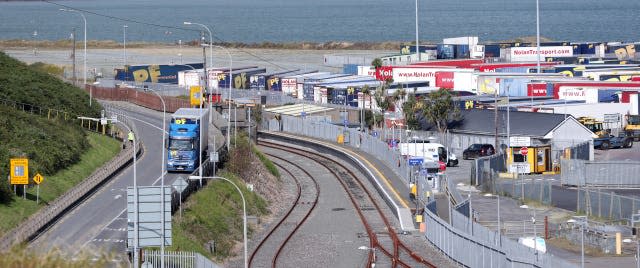Percy Pigs the first casualties of Brexit red tape
Percy Pigs are struggling to find their way across the Irish Sea to supermarket shelves in the Republic of Ireland in one of the first Brexit casualties.
Marks & Spencer revealed that getting to grips with new post-Brexit rules are becoming particularly tricky for the retailer’s porcine favourite.
At the company’s Christmas trading update, chief executive Steve Rowe explained how the sweets are a typical example of the problems facing retailers, as several report difficulties with new red tape.
But the problem is not confined to Percy Pigs and other retailers are already reporting struggles in understanding the new rules.
Mr Rowe said: “Essentially, there is about a third of the product in our food business that is subject to very complex rules of origin arrangements, around the components within it, and how much has been altered in the UK.
“Depending on that there is a variable tariff.

“Any product that’s manufactured in Europe, comes to the UK and is then redistributed to somewhere like Republic of Ireland also, potentially faces a tariff.
“So, the best example is Percy Pig is actually manufactured in Germany, and if it comes to the UK and we then send it to Ireland, in theory, he would have some tax on it.
“So we’ve got a lot to do in terms of composition and rerouting, but it’s really important that we continue to be focused on trading the business.
“And, at the moment, making sure we’ve got constant continuity of supply in our Irish business.”
The British Retail Consortium (BRC) said that “at least 50” of its members face potential tariffs for re-exporting goods following the agreement of the Trade and Co-operation Agreement (TCA).
“We appreciate that the rules of origin in the TCA were designed to be facilitative on trade in goods, but we need a solution which genuinely reflects the needs of UK-EU supply and distribution chains for goods,” said William Bain, trade policy adviser at the BRC.
“We are working with members on short-term options and are seeking dialogue with the Government and the EU on longer-term solutions to mitigate the effects of new tariffs.”

Following the agreement of the withdrawal deal, a raft of retailers including John Lewis and TKMaxx suspended deliveries into Northern Ireland amid uncertainty over new Irish Sea trading arrangements.
To try and combat the envisaged problems, M&S launched a new distribution centre in Motherwell exclusively to deal with supplying products to the island of Ireland, rather than from a warehouse that previously supplied Ireland and Britain.
But eight days into the new arrangements between the EU and UK, the centre is said to be struggling to cope with the new rules.
One problem for M&S is that many of its products sold in Ireland, like Percy Pigs, are sourced to the UK before being shipped out.
However, EU rules say “point of origin” must be declared on products going into member states.
Percy Pigs may find a workaround over time, but, bigger concerns will be with M&S’s myriad of ready meals or prepared dishes, which tend to have a long list of ingredients from around the world.
Meats, dairy and vegetables point of origin must be declared, meaning butter in one dish must be accounted for from one country, alongside a separate form for the meat and another for the vegetables, even if they are all in the same ready meal.

 Yahoo Finance
Yahoo Finance 